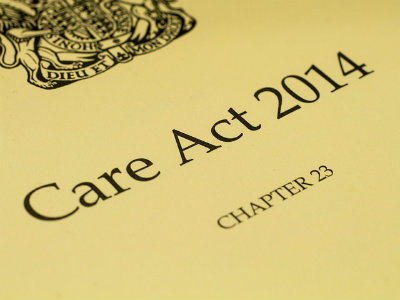
The Department of Health will seek deals with two councils on revised Care Act funding allocations in a bid to quash a legal challenge mounted by the local authorities, Community Care has learned.
The move comes after the High Court ruled that the legal claim from Wokingham and West Berkshire councils could go forward to judicial review, with a hearing expected in November. The councils brought the claim on the grounds that they had not been given enough money to implement the Care Act 2014, which came into force on April 1.
Both councils said that the DH’s promise to fully fund the implementation costs of the act had not been met in relation to them.
The Local Government Association (LGA) also joined the legal challenge as an interested party. The LGA supported the point of principle argued by the councils that they faced a new burden and also argued that the overall funding allocation given to councils to implement the Care Act in 2015-16 could be insufficient.
The DH is keen to avoid the case reaching a hearing, which would bring judicial scrutiny of the method used by government to determine Care Act funding allocations.
A DH spokesperson said ministers had decided to reconsider an initial decision not to give the two councils additional funding and would work with the local authorities to seek a settlement.
“Now that the Care Act has been implemented this can be based on the experience of transitioning to the national eligibility threshold,” the spokesperson said.
Councillor Julian McGhee Sumner, executive member for health and wellbeing at Wokingham council, said: “We are pleased that the Department of Health is now willing to work with us, as we had wanted all along, to reach an agreed position that recognises the true costs to Wokingham Borough residents of the changes introduced with the Care Act.”
West Berkshire and Wokingham, along with Northumberland, were the only councils in England operating the highest, ‘critical’ threshold for care under the Fair Access to Care Services (FACS) system of determining eligibility. On 1 April, FACS was replaced by the new national eligibility threshold brought in by the Care Act, which is supposed to approximate to the lower, ‘substantial’ threshold under FACS.
The DH said it had provided £28m to fund implementation of the new threshold, as part of a £124m allocation for the Care Act under the Better Care Fund. Overall, the government is providing £470m to implement the act in 2015-16. However, both Wokingham and West Berkshire say their allocation is insufficient to cover the costs of making care available to substantially more people.
West Berkshire estimated that it would cost the council £5.2m to implement the act in 2015-16, but it had only been given £2.2m by the DH, according to a council paper on its budget for the coming financial year.
It said it has had to fill the gap by dipping into its reserves, which would have to be replenished during the year at cost to local services. In a statement it said: “The Care Act – which comes into force on 1 April – sets out an expectation for West Berkshire council to provide levels of social care to substantially more people than it is currently able to. The government had previously said that it would fully fund the demands the Care Act placed on councils, but has now said that the necessary money for West Berkshire will not be forthcoming.”
A Wokingham council paper in February on its medium-term financial plan said the costs of the new threshold could run into the millions of pounds each year. It was forecasting that the threshold would cost £200,000 in 2015-16, £1m in 2016-17 and £1.5m in 2017-18.


 A trauma-informed approach to social work: practice tips
A trauma-informed approach to social work: practice tips  Problem gambling: how to recognise the warning signs
Problem gambling: how to recognise the warning signs 




 Find out how to develop your emotional resilience with our free downloadable guide
Find out how to develop your emotional resilience with our free downloadable guide  Develop your social work career with Community Care’s Careers and Training Guide
Develop your social work career with Community Care’s Careers and Training Guide  ‘Dear Sajid Javid: please end the inappropriate detention of autistic people and those with learning disabilities’
‘Dear Sajid Javid: please end the inappropriate detention of autistic people and those with learning disabilities’ Ofsted calls for power to scrutinise children’s home groups
Ofsted calls for power to scrutinise children’s home groups Seven in eight commissioners paying below ‘minimum rate for home care’
Seven in eight commissioners paying below ‘minimum rate for home care’
 Facebook
Facebook X
X LinkedIn
LinkedIn Instagram
Instagram
Comments are closed.